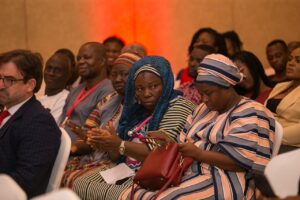Programme Manager of the Governance for Inclusive Development (GovID) programme, Raphael Frerking, has highlighted the pivotal role of strong and accountable public institutions in addressing the current economic crisis.
With strong and accountable institutions, he said, the well-being of all citizens, particularly marginalised groups, will be enhanced; emphasising that Metropolitan, Municipal and District Assemblies (MMDAs) – which are closest to the people – should be compelled to be accountable.
“Public institutions need to be resilient, strong, reliable, accountable and provide a safety net for their citizens in order to tackle these challenges,” said Frerking at the close-out event of the four-year GovID programme in Accra.

The GovID programme
The Deutsche Gesellschaft für Internationale Zusammenarbeit (GIZ) GmbH has since 2019 been implementing the programme, commissioned by the German Federal Ministry for Economic Cooperation and Development (BMZ) and backed by additional funding from the Swiss State Secretariat for Economic Affairs and the UK Foreign, Commonwealth and Development Office.
The programme forged a strong partnership with the Ministries of Finance, Local Government, and Rural Development to bolster national and subnational institutions in financing inclusive development within the country.
This collaboration yielded several significant outcomes, including the creation of new regulations on transfer pricing and implementation of an excise tax stamp policy – effectively curbing tax evasion by private sector entities.
It also supported drafting the environmental fiscal reform policy, updating the double taxation agreement policy, and establishing a policy for taxing high net worth individuals.
The programme brought about substantial enhancement of accountability mechanisms. For instance, in 2018 only 58 percent of audit recommendations were put into action within partner MMDAs. However, by 2022 this figure had risen to 85 percent, marking a substantial increase.
Again, in collaboration with the National Development Planning Commission, the GovID programme made medium-term development plans more inclusive through training in vulnerability profiling and development of a gender toolkit; the institutionalisation of gender desk officers within the MMDAs; and introducing the district-level revenue application (dLRev) – resulting in increased internally generated funds for all 100 partner MMDAs.

“I think we can say with confidence that the programme has made great progress in achieving its objective of financing inclusive development in Ghana,” Frerking said.
Swiss Ambassador Simone Giger emphasised that the programme has successfully played a role in reinforcing institutions essential to promoting good governance.
She stated: “Through the empowerment of governments, civil society organisations and local communities, these entities have gained the capacity to effectively manage their resources and fulfil their respective mandates”.
The Deputy Minister of Finance, John Kumah, added that the four-year programme’s implementation has been a success. “After four years, we are grateful to the programme for successes that we have been able to achieve; truly, they are living their objective of ensuring that Ghana is able to finance inclusive development.”










